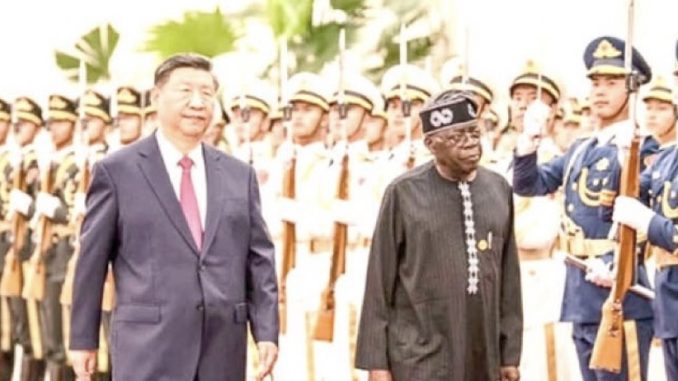
China has expressed its willingness to extend more loans to Nigeria, continuing a pattern of financial support aimed at aiding Africa’s largest economy in addressing its infrastructure and development needs.
The news comes as Nigeria grapples with rising debt and economic challenges under President Bola Tinubu’s administration, sparking mixed reactions from economic analysts and citizens alike.
The offer from China is reportedly focused on supporting infrastructure development, particularly in sectors like rail transport, energy, and telecommunications—areas where China has historically played a significant role in Nigeria’s modernization efforts.
However, the potential new loans have revived debates over the long-term implications of Nigeria’s growing debt to China.
History of Chinese Loans to Nigeria
China has been a key lender to Nigeria for over a decade, with its involvement becoming particularly prominent during the administration of former President Goodluck Jonathan.
Under Jonathan, Chinese loans were used to fund critical infrastructure projects such as the Abuja-Kaduna rail line and power plant projects across the country.
This trend continued under former President Muhammadu Buhari, who heavily relied on Chinese financial aid to fund large-scale projects.
The $1.5 billion Lagos-Ibadan railway project, which was commissioned in 2021, is one of the most prominent examples of Nigeria’s deepening reliance on Chinese funding.
Additionally, Buhari’s administration secured loans for various road and bridge projects, including the Second Niger Bridge, which was completed under his tenure.
By the end of Buhari’s presidency in 2023, Nigeria’s debt to China had ballooned to over $4 billion, raising concerns among economic analysts about the sustainability of such borrowing.
Critics worried about the potential for Nigeria to fall into a “debt trap” with China, with fears of asset forfeiture if Nigeria failed to meet its debt obligations.
Current Concerns and Reactions
As President Bola Tinubu’s administration navigates through economic reforms aimed at reducing inflation, boosting revenue, and tackling unemployment, China’s offer of additional loans has been met with cautious optimism.
While many view China’s ongoing investment as crucial to Nigeria’s infrastructure development, others worry about the long-term effects of increasing the national debt, particularly with Nigeria’s debt-to-GDP ratio reaching concerning levels.
Nigeria’s Finance Minister has stated that any new loans would be subject to stricter scrutiny and better terms, ensuring they are used for projects that will generate revenue and create jobs for Nigerians. Nevertheless, the potential for increased debt burdens remains a hot topic of debate.
Economic analysts have also raised questions about the transparency of these loans, urging the government to ensure that future deals are made with clear repayment terms and without compromising Nigeria’s sovereignty.
China’s willingness to lend more money to Nigeria comes at a critical time, as the nation faces daunting economic challenges. While the loans could provide a much-needed boost to infrastructure development, the concerns surrounding debt sustainability and dependence on Chinese funding are likely to persist.
As President Tinubu’s government continues to chart its path forward, the balance between securing international loans and safeguarding Nigeria’s financial future remains a delicate issue.